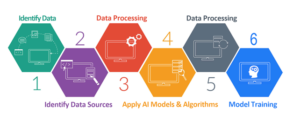Enterprise computing has already gone several steps ahead because of mobility. The mobile technology is helping businesses introduce such software and systems that let employees do their jobs from anywhere using their own mobile devices. With enterprise mobility, employees have turned more flexible, which contribute to their job satisfaction and increase productivity. Also, the enterprise mobility has come to a level where an employer does not need to provide its own devices to their employees. The robust security is encouraging employers to accept the concept of BYOD.
But that’s not all for enterprise computing. The revolution trigged by mobility has now all set to go the next level and, this time Artificial Intelligent is leading it.
The blend of Artificial Intelligent and enterprise mobility helps business think, do and deliver what their competitors cannot. Smart businesses have already discovered how AI can add value to their processes. AI is applied to an enterprise mobility app through multifaceted approaches. The effect is seen in the areas of device management, user experience, security, and applications.
Artificial Intelligence can replace numerous operations and activities, such as desk services, application support, project, and system administration. The technology is solving a number of real-life problems. Major tech companies like Google, Microsoft, Apple and Amazon have already proved the potentials of AI theologies through their consumer products like products like Home, Cortana, Siri, and Echo.
Gartner has projected that by 2020, 41% of new enterprise applications implemented by service providers will use AI technologies. The modern AI technologies come with their super-human like capabilities that do not only remarkably improve efficiency but also minimize the probability of errors.
With AI, enterprises are able to solve such problems, which are difficult for the human workforce. We are not talking about a self-aware robot or car driving on its own, but about several activities that matter an organization. AI chat-bots, for example, help a business create an easier channel between it and its prospects.
Artificial Intelligence isn’t also a threat for workers. Modern workers want to adopt the AI as a sophisticated technology that helps in making their operations simple, instead.
How artificial intelligence works
There is a standard and well-defined procedure available on how Artificial Intelligence is implemented. First of all, AI must identify data from various sources like usages, devices, discrete and unmatched sets. Once identification completes, the data is processed and applied to AI models. Then the algorithms are used to trained models so that they can deal with different problems and finally the system is deployed to give outputs.
- Identify Data
- Identify Data Sources
- Data Processing
- Apply AI Models and Algorithms
- Model Training
- Model Deployment

HOW ARTIFICIAL CAPABILITIES CAN IMPROVE THE MOBILITY FOR ENTERPRISES
- AI in smartphones
More and more enterprises have begun to rely on smartphones and apps along with several others capabilities of the mobility. With tech companies pushing AI very hard to improve the overall efficiency of smart mobility, enterprise application development companies to have started to find the ways to implement AI to smart mobility.
These phones and apps are capable of learning from the users’ habits and then create the apps’ priority and rearrange apps as per the preferences. They are able to manage resources by prioritizing CPU, RAN, and ROM to enhance their own performance and create more memory for priority apps.
- AI-driven sentiment analysis
Businesses always want to know what exactly their customers are thinking about a product or service so that they can come up with better plans to place their products in the market. AI allows businesses to do this with the sentiment analysis. With AI, businesses learn about attitudes, opinions, and emotions that customers keep on expressing via their search behavior, engagement, reviews, feedback, etc.
- Automated reasoning
AI’s subfield automated reasoning is the technology in which computer programs perform reasoning completely and automatically. Uber, for example, uses an Automated Reasoning system to optimize routes so that drivers can drive passengers through fastest routes to their destinations. The automated reasoning system finds out data from other Uber drivers traveling in similar routes and then understands the patterns, and suggests for the best routes to drivers for their future trips.
- Data Mining and predictive analytics
Data mining is one most demanding practice that every business wants to adopt and look in scopes to reach interesting conclusions. The key tasks performed in data mining are data storage, data maintenance, and data analyzing. AI helps in devising tools and learning algorithms to find possible relationships between different data-sets.
The next level in data mining is adopting the approach called predictive analysis. This approach predicts trends than merely detailing description, classifying and clustering. AI makes predictive analysis a possible simple thing.
- Detection of abnormality
AI can also provide enterprises a system against various external threats and abnormalities. It keeps tabs on the continuous activities, detects abnormalities, and trigger alarms. In result, administrators are able to take desired security measures before a system gets compromised by attackers.
- Automatically prioritization of problems
Because AI can track everything happening in a computing system, from processing to requests, to delivery, to resource consumption, it can also help in prioritizing problems and try to fix them as per preference than wasting time to find solutions.
- Chat-bots
Many businesses are booming on chat-bots as they assist their customers proactively and with better answers to their problems. These chat-boats are powered by the technologies of Artificial Intelligent.
Author Bio: Sofia is a digital marketing expert in Rapidsoft Technologies which is a leading IT consulting company providing full range it services including, IoT app development, Blockchain development, and big data app development solutions.
Leave a Reply